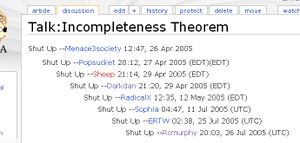Incompleteness Theorem
“Your theorem's not complete without nutritious, delicious, refreshingly demanding Ovaltine” - Oscar Wilde
“Yes it is, now shut up!” - Kurt Gödel“No, you shut up!” - Oscar Wilde“Shut up!” - Kurt Gödel“Shut up!” - Oscar Wilde“Shut up!” - Kurt Gödel“Shut up!” - Oscar Wilde
Gödel's famous Incompleteness Theorem states that no Talk page is ever complete. He proved it by the diagonalization method, forming a diagonal string of comments of "we should end this discussion now" entries.
This result was later improved on by repeatedly adding of "Shut up".
Example of the diagonalization method:
Shut up --UserA
Shut up --UserB
Shut up --UserA
Shut up --UserB
Shut up --UserA
Shut up --UserB
Shut up --UserA
Shut up --UserB
etc.
In Europe, a similar law holds for "Thank you"s:
Thank you --UserA
Thank you --UserB
Thank you --UserA
Thank you --UserB
Thank you --UserA
Thank you --UserB
Thank you --UserA
Thank you --UserB
etc.
One variant of the Incompleteness Theorem states, that no puzzle is ever complete, there is always one piece of the puzzle that is missing. Again, to determine the missing piece, one can use the diagonal method: when one simply starts with one piece which is at an edge or in the corner, and moves diagonally across the puzzle, one will certainly find that a piece is missing.
Yet another variant of the Incompleteness Theorem states, that no computer program is ever complete. One can find places where code is missing, by moving diagonally through the code, starting at the first or last word of all subroutines / functions / procedures / whatever you want to call it.
A more modern version of the Incompleteness Theorem states that
- To be confused with Godel's Incompleteness Theorem, whose author was too lazy to use umlauts.
- Also to be confused with Goedel's Incompleteness Theorem ('oe' replacing the umlauted 'ö'), whose author has been too lazy so far to post it onto Uncyclopedia.
- No it isn't...
- Yes it is...
- No it isn't...
- Yes it is...
- No it isn't...
- Yes it is...
See also


